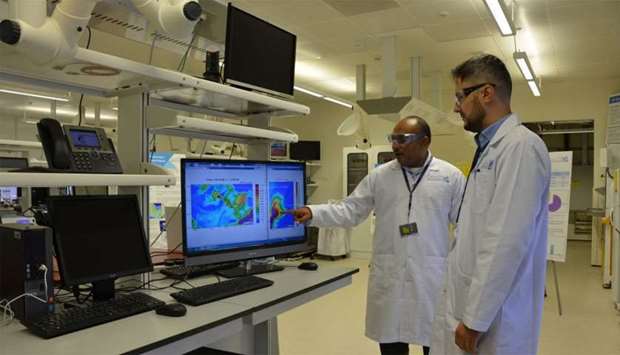Following its research mission to help tackle Qatar’s grand challenges in the fields of energy, water security and environment, the Qatar Environment and Energy Research Institute (Qeeri), one of Hamad Bin Khalifa University’s three national research institutes, recently commissioned its fourth permanent Air Quality Monitoring Station (AQMS) at the American School of Doha.
The stations continuously measure the concentration of pollutants in the air, including gases (such as ozone, nitrogen oxides, methane), particulate matter as well as meteorological parameters (such as temperature, wind speed, direction) in high time resolution.
In effect, the AQM stations forge co-operative bonds between Qeeri’s researchers and national stakeholders by collecting reliable data that help quantify the impact of poor air quality on environment, energy and health systems in the country.
Qeeri’s executive director, Dr Marc Vermeersch, said, “We are committed towards providing a better understanding of Qatar’s air quality, including its primary causes and impact. This information can help provide valuable information to the local community and guide best-practice development in the health and safety sectors. Consequently, we have established a close working relationship with a number of private and governmental stakeholders from across various industries to join forces on this nationally significant initiative.”
Qeeri’s growing Air Quality and Climate Change Research activities are designed to support the systematic development and evaluation of national policies, strategies and technologies aimed at mitigating the negative impacts of poor air quality as well as adapting to climate change.
“The monitoring network gives us a clearer understanding of the underlying causes of Qatar’s air quality, including the sources and types of pollutants, the mechanisms that induce episodic days and the contribution of long-range transport of polluted air masses into Qatar. As such, it forms the basis for the development of sustainable methodologies for future adaptations to climate change,” said Mohamed Ayoub, Air Quality and Climate Change Research Portfolio lead at Qeeri.
“The first AQMS was commissioned in 2014 and by the end of the year, we plan to establish a total of six stations across the greater Doha area. Currently, four AQM stations are operational in Sheehaniyah, Qatar Foundation, Al-Soudan, and Al-Wakrah. The AQM stations at Hamad Medical City and Al-Thumama are under commissioning,” he added.
The location of each station was carefully selected based on siting studies that account for population distribution, prevalent wind direction, land use (residential, commercial, traffic, other) and future infrastructure development plans. The Qatar Foundation “super site” was established on the roof of the HBKU Research Complex; it will house the upcoming Aerosol Chemical Speciation Monitor along with other high fidelity measurements.

